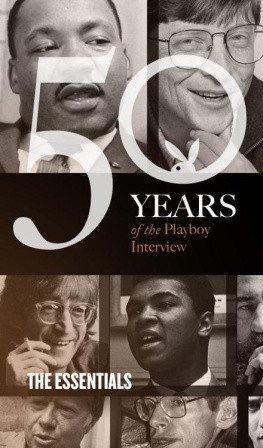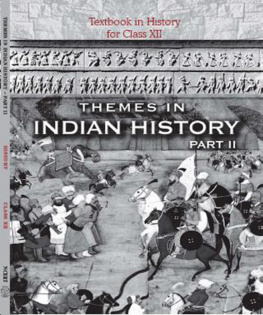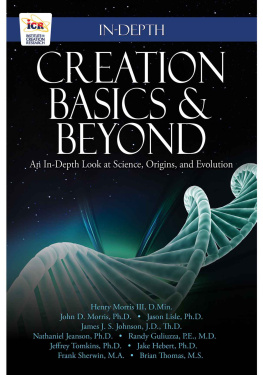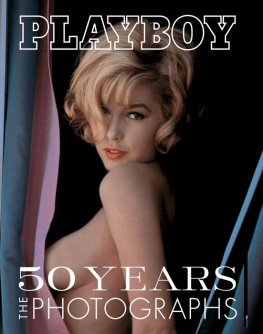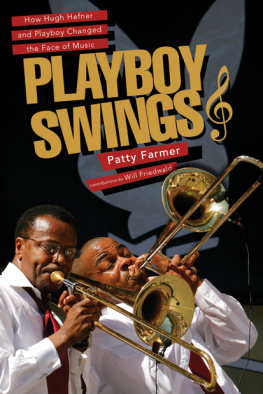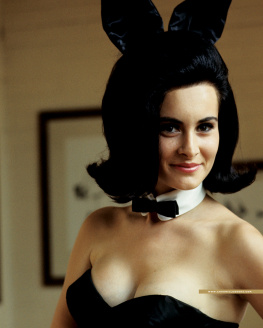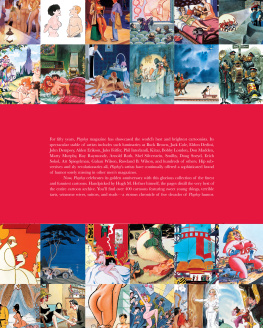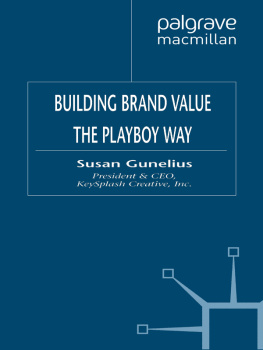Various - The Playboy Interview - The Essentials
Here you can read online Various - The Playboy Interview - The Essentials full text of the book (entire story) in english for free. Download pdf and epub, get meaning, cover and reviews about this ebook. year: 0, genre: Art. Description of the work, (preface) as well as reviews are available. Best literature library LitArk.com created for fans of good reading and offers a wide selection of genres:
Romance novel
Science fiction
Adventure
Detective
Science
History
Home and family
Prose
Art
Politics
Computer
Non-fiction
Religion
Business
Children
Humor
Choose a favorite category and find really read worthwhile books. Enjoy immersion in the world of imagination, feel the emotions of the characters or learn something new for yourself, make an fascinating discovery.
The Playboy Interview - The Essentials: summary, description and annotation
We offer to read an annotation, description, summary or preface (depends on what the author of the book "The Playboy Interview - The Essentials" wrote himself). If you haven't found the necessary information about the book — write in the comments, we will try to find it.
Various: author's other books
Who wrote The Playboy Interview - The Essentials? Find out the surname, the name of the author of the book and a list of all author's works by series.
The Playboy Interview - The Essentials — read online for free the complete book (whole text) full work
Below is the text of the book, divided by pages. System saving the place of the last page read, allows you to conveniently read the book "The Playboy Interview - The Essentials" online for free, without having to search again every time where you left off. Put a bookmark, and you can go to the page where you finished reading at any time.
Font size:
Interval:
Bookmark:
CONTENTS
About the Book
Copyright 2012 Playboy Enterprises, Inc.
All rights reserved, including the right to reproduce this interview or portions thereof in any form whatsoever. For the full Playboy archiveincluding every Playboy Interview ever publishedvisit i.playboy.com .
About the Series: In mid-1962, Playboy founder Hugh Hefner was given a partial transcript of an interview with Miles Davis. It covered jazz, of course, but it also included Daviss ruminations on race, politics and culture. Fascinated, Hef sent the writerfuture Pulitzer Prizewinning author Alex Haley, an unknown at the timeback to glean even more opinion and insight from Davis. The resulting exchange, published in the September 1962 issue, became the first official Playboy Interview and kicked off a remarkable run of public inquisition that continues todayand that has featured just about every cultural titan of the last half century.
To celebrate the interviews 50th anniversary, the editors of Playboy have assembled 13 compilations of the magazines most (in)famous interviewsfrom big mouths and wild men to sports gods and literary mavericks. Here is our collection of the 50 most essential interviews.
Miles Davis, September 1962
The technical and emotional brilliance of the trumpet played by Miles Davis has made him one of the most provocative influences in modern jazz. We spent two days with Miles not long ago in his rather unusual five-story home, a converted Russian Orthodox Church on West 77th Street near the Hudson River in New York City. Miles was between gigs at the time and we accompanied him on his restless daily home routine, asking questions at propitious moments while he worked out in his basement gymnasium, made veal chops Italian style for his family, took telephone calls from fellow musicians, his lawyer and stockbroker, gave boxing lessons to his three sons, watched TV, plucked out beginners chords on a guitar and, of course, blew one of his two Martin trumpets, running up and down the chromatic scale with searing speed. Spending time with Miles in the refuge of his own home, and seeing him surrounded by the activities and people he loves, it was hard to reconcile this reality with his sometimes flinty and truculent public posture. It was on this facet of his personality that we first queried him.
Playboy: Linked with your musical renown is your reputation for bad temper and rudeness to your audiences. Would you comment?
Davis: Why is it that people just have to have so much to say about me? It bugs me because Im not that important. Some critic that didnt have nothing else to do started this crap about I dont announce numbers, I dont look at the audience, I dont bow or talk to people, I walk off the stage, and all that.
Look, man, all I am is a trumpet player. I only can do one thingplay my hornand thats whats at the bottom of the whole mess. I aint no entertainer, and aint trying to be one. I am one thing, a musician. Most of whats said about me is lies in the first place. Everything I do, I got a reason.
The reason I dont announce numbers is because its not until the last instant I decide whats maybe the best thing to play next. Besides, if people dont recognize a number when we play it, what difference does it make?
Why I sometimes walk off the stand is because when its somebody elses turn to solo, I aint going to just stand up there and be detracting from him. What am I going to stand up there for? I aint no model, and I dont sing or dance, and I damn sure aint no Uncle Tom just to be up there grinning. Sometimes I go over by the piano or the drums and listen to what theyre doing. But if I dont want to do that, I go in the wings and listen to the whole band until its the next turn for my horn.
Then they claim I ignore the audience while Im playing. Man, when Im working, I know the people are out there. But when Im playing, Im worrying about making my horn sound right.
And they bitch that I wont talk to people when we go off after a set. Thats a damn lie. I talk plenty of times if everythings going like it ought to and I feel right. But if I got my mind on something about my band or something else, well, hell, no, I dont want to talk. When Im working Im concentrating. I bet you if I was a doctor sewing on some son of a bitchs heart, they wouldnt want me to talk.
Anybody wants to believe all this crap they hear about me, its their problem, not mine. Because, look, man, I like people. I love people! Im not going around telling everybody that. I try to say that my waywith my horn. Look, when I was a boy, 10 years old, I got a paper route and it got bigger than I could handle because my customers liked me so much. I just delivered papers the best I could and minded my business, the same way I play my horn now. But a lot of the people I meet now make me sick.
Playboy: What types of people do you find especially irritating?
Davis: Well, these people thats always coming up bugging me until they get me to act like this crap they heard. They ask you things, you say what you think, and if it aint what they want to hear, then somethings wrong with you and they go away mad and think you dont like them. I bet I have had that happen 500 times. In this last club I played, this newspaper reporter kept after me when I told him I didnt have no more to say. He wasnt satisfied with that. After the next set, he come up again, either drunk or playing drunk, and shoved into me. I told him to get the hell out of my way, and then he was finehe went right out and wrote that. But he didnt tell how it happened.
And Im mad every time I run into the Jim Crow scene, I dont care what form it takes. You cant hardly play anywhere you dont run into some of these cats full of prejudice. I dont know how many Ive told, Look, you want me to talk to you and youre prejudiced against me and all that. Whynt you go on back where youre sitting and be prejudiced by yourself and leave me alone? I have enough problems without trying to make them feel better. Then they go off and join the rest saying Im such a big bastard.
Ive got no plans of changing what I think. I dont dig people in clubs who dont pay the musicians respect. The average jazz musician today, if hes making it, is just as trained as classical musicians. You ever see anybody go up bugging the classical musicians when they are on the job and trying to work?
Even in jazzyou look at the white bandleadersif they dont want anybody messing with them when they are working, you dont hear anybody squawking. Its just if a Negro is involved that theres something wrong with him. My troubles started when I learned to play the trumpet and hadnt learned to dance.
Playboy: You feel that the complaints about you are because of your race?
Davis: I know damn well a lot of it is race. White people have certain things they expect from Negro musiciansjust like theyve got labels for the whole Negro race. It goes clear back to the slavery days. That was when Uncle Tomming got started because white people demanded it. Every little black child grew up seeing that getting along with white people meant grinning and acting clowns. It helped white people to feel easy about what they had done, and were doing, to Negroes, and thats carried right on over to now. You bring it down to musicians, they want you to not only play your instrument, but to entertain them, too, with grinning and dancing.
Playboy: Generally speaking, what are your feelings with regard to race?
Davis: I hate to talk about what I think of the mess because my friends are all colors. When I say that some of my best friends are white, I sure aint lying. The only white people I dont like are the prejudiced white people. Those the shoe dont fit, well, they dont wear it. I dont like the white people that show me they cant understand that not just the Negroes, but the Chinese and Puerto Ricans and any other races that aint white, should be given dignity and respect like everybody else.
Font size:
Interval:
Bookmark:
Similar books «The Playboy Interview - The Essentials»
Look at similar books to The Playboy Interview - The Essentials. We have selected literature similar in name and meaning in the hope of providing readers with more options to find new, interesting, not yet read works.
Discussion, reviews of the book The Playboy Interview - The Essentials and just readers' own opinions. Leave your comments, write what you think about the work, its meaning or the main characters. Specify what exactly you liked and what you didn't like, and why you think so.

